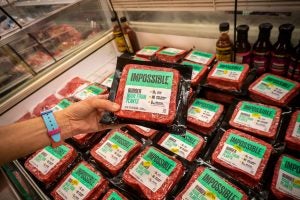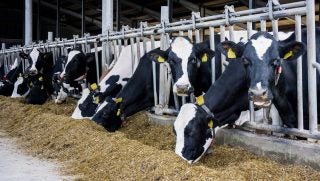Lab-grown meat cultured from animal cells. Soy-based chicken nuggets. Hamburgers made from mushrooms? There are a host of products out there all claiming to be the next best “alternative” to meat, but do any of them stand a chance on the market when compared to the real deal?
What’s more, it’s prudent to wonder if these companies who claim their product is the key to a more sustainable food system really care about the environment, or is it all a scheme to turn a profit on a false narrative cultivated to attack animal ag?
Perhaps the most highly invested concept in food tech today is the proposition of “cultivated meat,” a product grown from feeding a nondisclosed cell-culture medium to animal tissue cells in steel bioreactors. This lab-grown meat — also labeled as “slaughter-free meat” and clean meat” by the scientists who created it — was first put to the test by Upside Foods.

In 2016, consumers were shocked when the startup, formerly known as Memphis Meats, released the “world’s first cultivated beef meatball” that was allegedly made of real beef grown in a laboratory. While this technology was first heralded as the “cure-all” to feeding a rapidly growing meat-eating population, there are two major problems that have limited its long-term success.
Firstly, it is really expensive to produce cultivated meat. Like, incredibly expensive. According to a 2022 analysis breaking down the predicted costs of a large-scale production facility, the optimistic projections may still be too high to catch on to even the animal-rights activist’s budget. For a quarter pound lab-grown hamburger, you may have to pay $18 dollars or more … and it doesn’t even come with cheese!
Secondly, it has been found that cultured cells are highly susceptible to contamination. Unlike animals, cells by themselves have no immune system to fight off bacteria or viruses. The large 20,000-liter bioreactors in which cultivated meat is grown can become contaminated by the smallest speck of bacteria from a lab worker’s glove, which ultimately infects all the cells and results in having to dump all of the product being grown.
Furthermore, sterility is a challenge that becomes increasingly more difficult in larger volumes. Any breach in biosecurity can shut down a plant, resulting in the loss of millions of dollars’ worth of product. Alternatively, meat produced from traditional animal agriculture is heavily safeguarded against illness thanks to an animal’s built-in immune system, which is bred to be resilient. Responsible antibiotic stewardship and strict biosecurity practices enabled by farmers and ranchers further ensure that animals are protected from microscopic threats.
Despite the initial hype surrounding cultivated meat, these companies have also been known to repeatedly extend their launch deadlines, teasing that their products are “just around the corner” from being found on grocery store shelves. Given the fact that these products still have yet to hit stores in America and Gen Z’s overall negative response to the concept of eating lab-grown meat, it’s safe to say that the $5 Angus beef Big Mac is here to stay.

Plant-based meat alternatives have been an option for those not interested in animal-based products for decades. Unlike cell-cultured meat, plant-based alternatives claim to contain no animal products at all but may still attempt to simulate the texture and flavor of real meat. While plant-based companies continue to trumpet their alleged dramatic rise in sales, recent polls reveal that their target audience continues to remain stagnant, with prominent companies like Beyond Meat struggling to survive. A 2022 poll revealed that only 5 percent of Americans claim to be vegetarian, while 3 percent claim to be vegan, an overall steady number compared to previous years.
According to The Washington Post, retail sales for alt-meat products flattened in 2020 and have since continued to drop, plummeting another 10 percent just last year. While there will likely always be a niche market catering to those with plant-based dietary preferences, I believe the likelihood of these ultra-processed products replacing American animal agriculture entirely is next to impossible.
Unknown to many, there is yet another obscure protein alternative that has recently been embraced by a small population of radical supporters: mushrooms. Fungi-based meat, or mycoprotein, has been primarily popularized by the modern food company known as Quorn.
The fungus of choice in this lab-based product is Fusarium venenatum, a microorganism found in the soil, which is fermented in vats and heavily processed to achieve the desired texture that resembles that of meat. Like cell-cultured meat startups, Quorn claims to produce a “more sustainable protein” when compared to real meat, claiming it’s a “fact” that meat consumption is directly linked to obesity and climate change, despite no citations or scientific literature to back up their allegations.
Knowing that their product is a highly processed lab-grown fungus, we can imagine that using less water would be one of the only benefits that could push this wholly unappealing product to consumers, especially when its competitor is a minimally processed, naturally sustainable, tasty and nutritious protein.
There is no doubt that meat alternative startups will continue to use fearmongering tactics and project unrealistic goals to keep food investors interested in their businesses. It is also likely that even if cell-cultured meat and other experimental meat alternatives do eventually make it to the market, they will likely fight for the same limited refrigerator space for that small percentage of vegetarian and vegan Americans.
In this nation, we all pride ourselves on the freedom to choose our own lifestyles. For the huge percentage of Americans who choose to incorporate real meat in their diets, we pride ourselves even more in supporting the hardworking 1 percent that feeds us safe, nutritious, natural, and sustainable protein that we know will never go out of style.
Michelle Miller, the “Farm Babe,” is an internationally recognized keynote speaker, writer, and social media influencer and travels full time to advocate for agriculture. She comes from an Iowa-based row crop and livestock farming background and now resides on a timber farm in North Central Florida.



